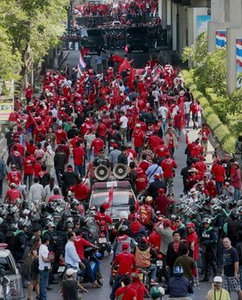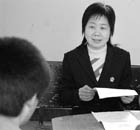Asia-Pacific
Red Shirt protesters flood streets of Bangkok
(Agencies)
Updated: 2010-04-06 16:59
 |
Large Medium Small |
BANGKOK - Thousands of anti-government demonstrators broke through police and military lines Tuesday to flood the streets around Bangkok's business district and other areas of Thailand's capital.
Earlier, the demonstrators pushed against police lines and pelted the riot squads with eggs and plastic water bottles along the tree-lined Rajdamri Avenue in front of the Four Seasons Hotel. After several hours of confrontations and negotiations, the demonstrators rushed through the blockade.
Protest leaders have defied a government order to vacate the commercial heart of Bangkok as they try to pressure Prime Minister Abhisit Vejjajiva to relinquish power. They vowed Tuesday to stage convoys through 11 main city roads the administration has declared off-limits to them.
"We will teach the government a lesson -- that every road belongs to the people," said a protest leader, Nattawut Saikua.
|
|
On Tuesday morning, about 1,000 riot police and soldiers faced off against a similar number of protesters on Rajdamri Avenue as luxury hotels in the area barricaded their doors, guests taking photographs from a safe distance. Similar confrontations were reported in other areas.
Some of the protesters clambered atop police trucks parked across the road to block the demonstrators. The light overhead railway that runs above Rajdamri Avenue was shut down by the operators.
"We were going to see a movie," said Les Stanley, a 55-year-old Australian resident in Bangkok. "Oh well, this is more interesting than a movie."
The government restated that it wanted to solve the crisis peacefully.
"Under the current climate, many citizens wouldn't want violence to take place or confrontation. And we've been mindful of that concern," government spokesman Panithan Wattanayakorn said as the clashes began.
Business leaders have called for an end to the crisis, predicting even greater shocks to the economy and tourism if it persists.
More than a dozen shopping malls were set to close their doors for the fourth day in Bangkok's luxury shopping district, which includes five-star hotels like the Four Seasons, the Hyatt and InterContinental. Guests at the hotels there were checking out in greater numbers.
"The protests have hit thousands of entrepreneurs as well as their staff and employees because (the area) is a prime shopping and tourist location," said a joint statement by three leading business associations in the district, which estimated losses in the area since the occupation began at up to 900 million baht ($28 million).
The "Red Shirt" protesters, mostly farmers from impoverished provincial areas who have characterized their movement as a class war against the Bangkok elite, have sworn not to let up their pressure until Abhisit steps down and calls new elections. Abhisit has offered to call elections by the year's end, but the protesters want quicker action.
The movement -- known formally as the United Front for Democracy Against Dictatorship -- contends that Abhisit came to power illegitimately in the years after ex-Prime Minister Thaksin Shinawatra was removed in a 2006 coup on corruption allegations. The group is made up largely of Thaksin supporters and pro-democracy activists who opposed the putsch.
So far, the government has refrained from using force against them despite pressure from segments of the Bangkok population fed up by business losses and disruption to daily life.
Allies of Thaksin -- whose policies of cheap health care and low-interest village loans benefited the rural poor from which many of the protesters are drawn -- won the first elections after the coup but two resulting governments were forced out by court rulings. A parliamentary vote brought Abhisit's party to power in December 2008. The Red Shirts say his rule is undemocratic and that only new elections can restore integrity to Thai democracy.
Abhisit must call new elections by the end of 2011, and many believe Thaksin's allies are likely to win -- which could spark protests by Thaksin's opponents.
Thaksin, a multimillionaire convicted in absentia on corruption-related charges, is a fugitive abroad and encourages the Red Shirts with frequent messages. His six years in office were riddled by accusations of nepotism and an erosion of democratic institutions.











